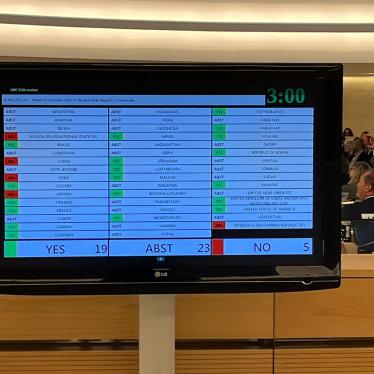By recognizing the state’s role in the 1990 murder of anthropologist Myrna Mack, Guatemalan President Oscar Berger today took an important step in promoting accountability for past human rights violations, Human Rights Watch said.
The president’s declaration at a ceremony in Guatemala City was in partial fulfillment of a ruling by the Inter-American Court of Human Rights, which in December held that Guatemala should publicly recognize the state’s responsibility for the murder and subsequent denial of justice in the case. The Court also ruled that Guatemala should ensure that the perpetrators of the crime be brought to justice.
“President Berger has sent an encouraging signal that he is committed to promoting accountability for past human rights abuses,” said José Miguel Vivanco, executive director of the Americas Division of Human Rights Watch. “He should now take steps to ensure that those responsible for the Mack murder and thousands of other political killings in Guatemala are brought to justice.”
Mack, an anthropologist, had been studying the army’s mistreatment of displaced rural communities when she was attacked in front of her Guatemala City office on September 11, 1990. Stabbed 27 times, she bled to death in the street. Police initially informed Mack’s relatives that she had died in a traffic accident. Later, they suppressed a 60-page report by their own investigators concluding that it had been a political killing and linking the military to the crime. Only after Helen Mack, Myrna’s sister, intervened did the case begin to move forward.
In 1993, a Guatemalan court sentenced an army officer, Sgt. Noel Beteta, to 25 years for carrying out the murder. In 2002, another Guatemalan court sentenced Col. Juan Valencia Osorio to 30 years for his role in planning the killing. An appeals court later overturned that conviction, but it was reinstated by the Supreme Court last year.
A police investigator who initially gathered the incriminating evidence was murdered in 1991. Two other investigators and three witnesses also received threats and fled the country. In 2002, a lawyer acting for the Myrna Mack Foundation reported receiving death threats.
Col. Valencia Osorio is the only senior officer to be convicted for human rights violations committed as part of the country’s 36-year civil war, which claimed the lives of an estimated 200,000 people, most of them civilians killed by government forces. However, since the Supreme Court reinstated his conviction last year, he has managed to elude police custody, and his whereabouts remain unknown today.
“President Berger should do all he can to ensure that Valencia Osorio is arrested and made to serve his sentence,” said Vivanco. “Although today’s ceremony was an important gesture, it is no substitute for justice.”







